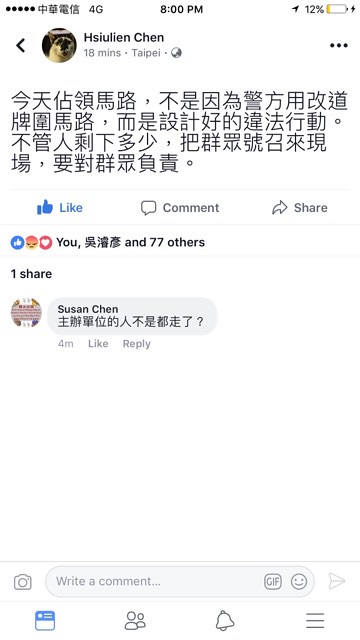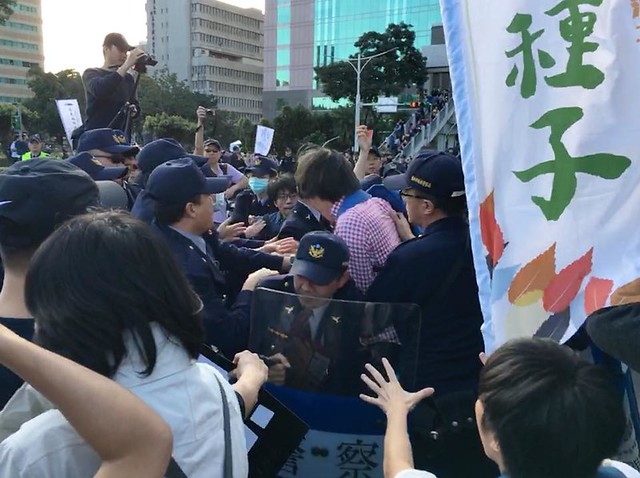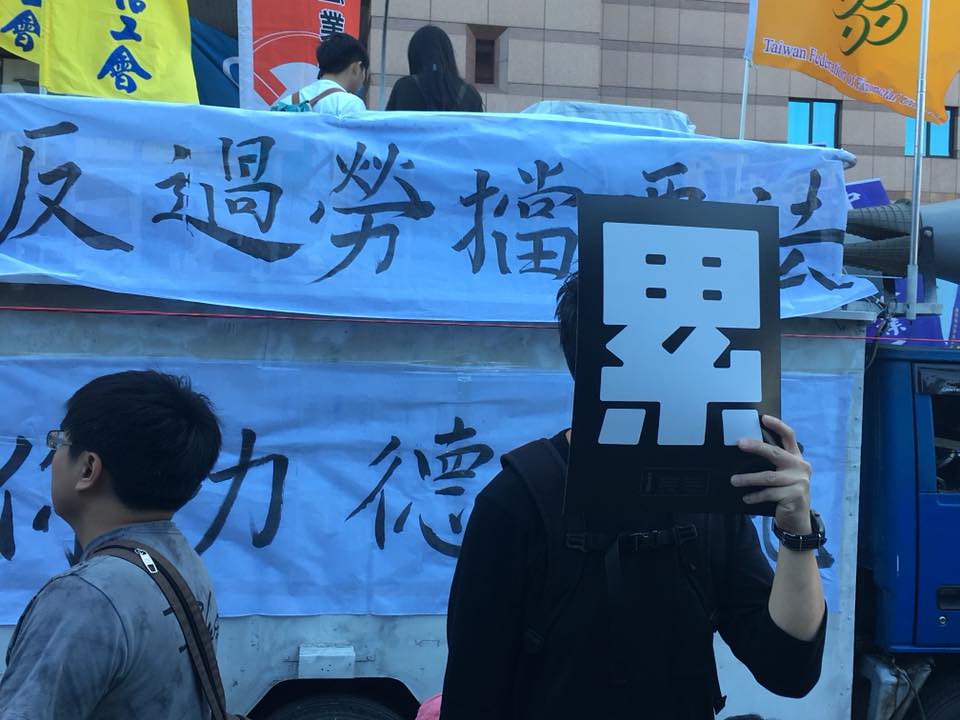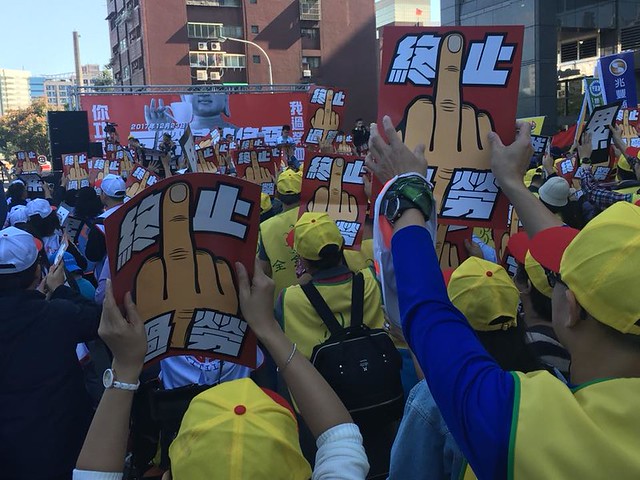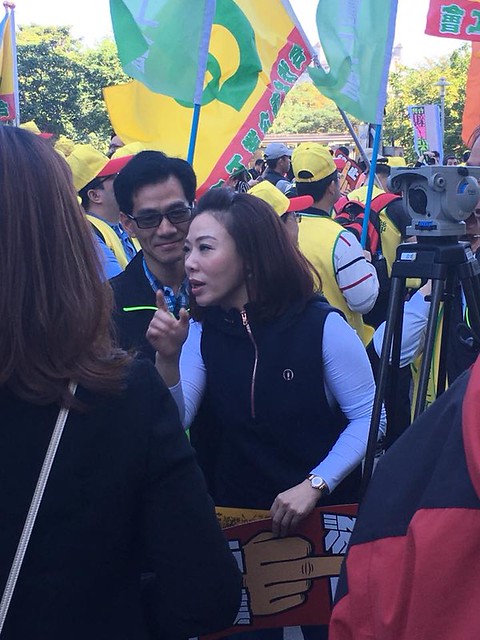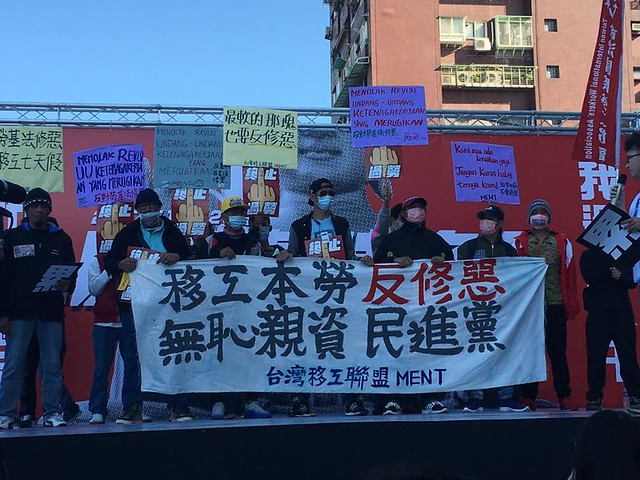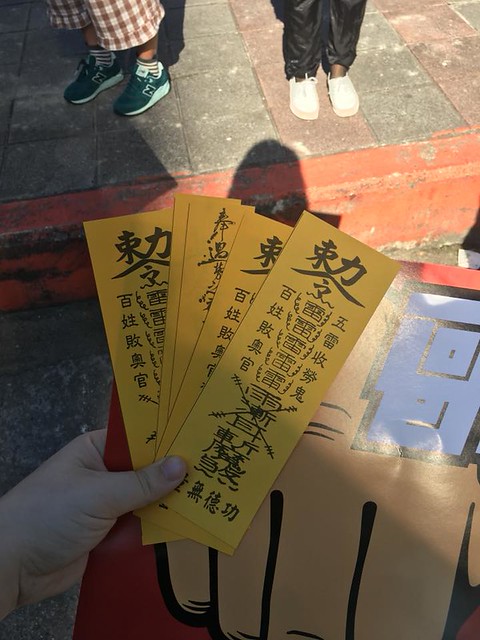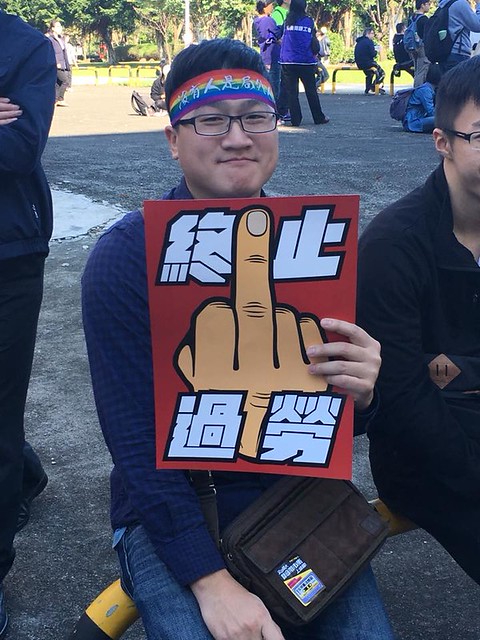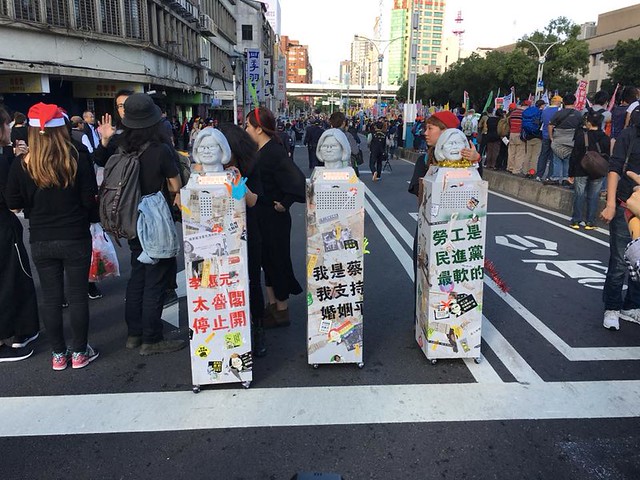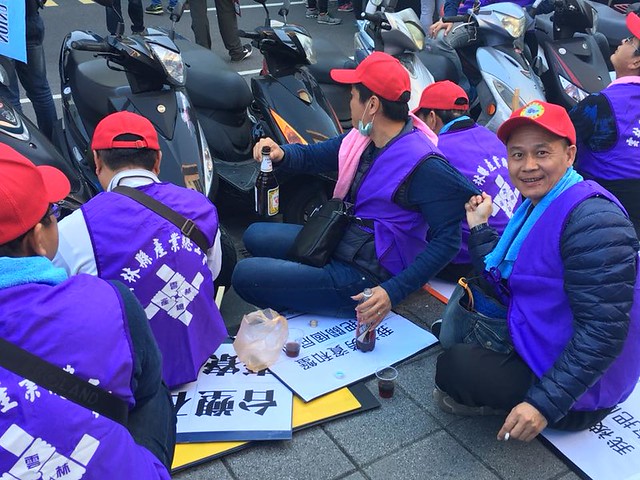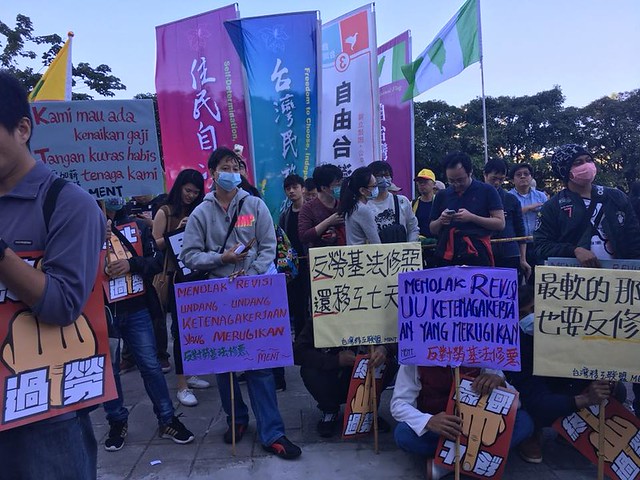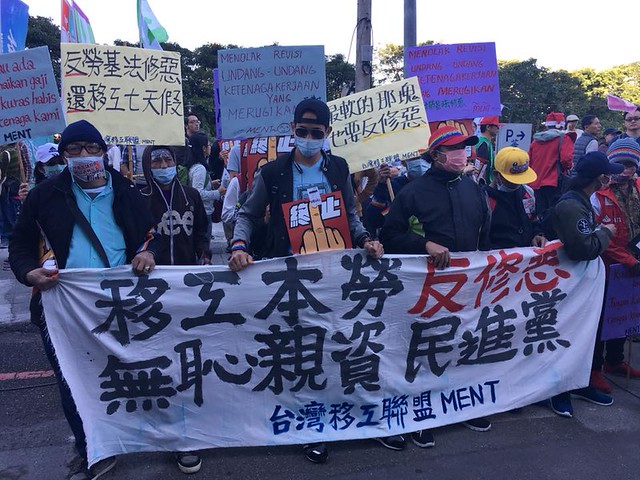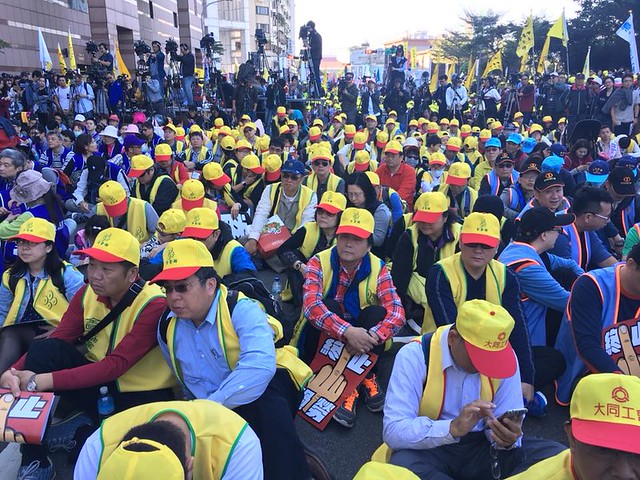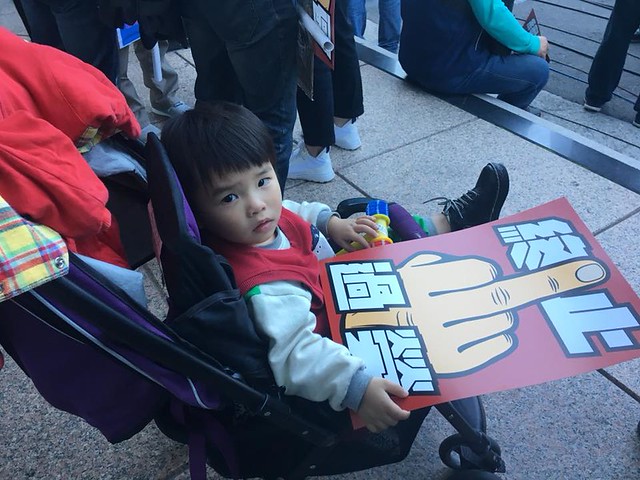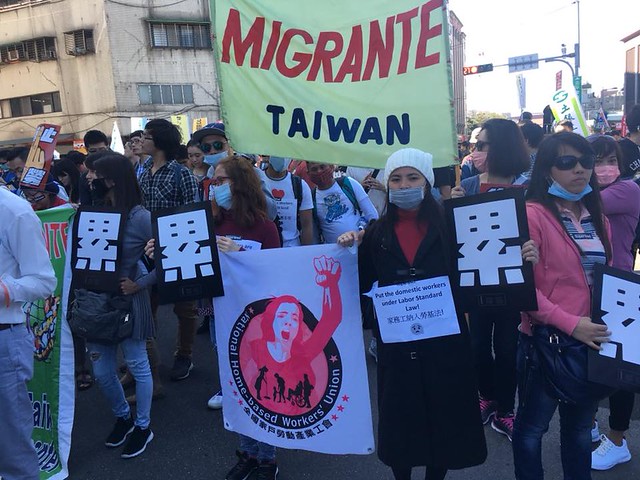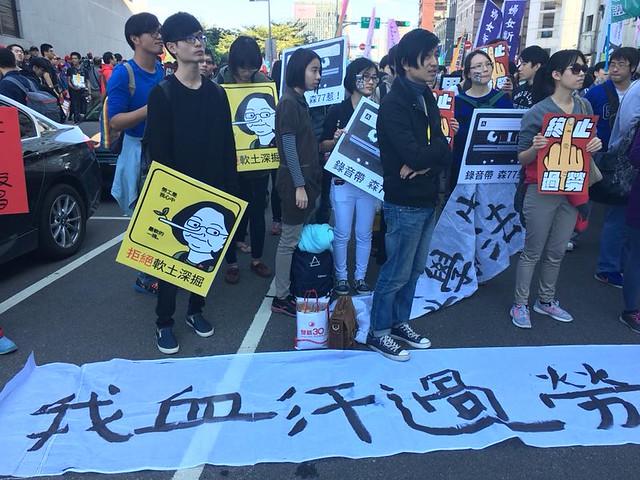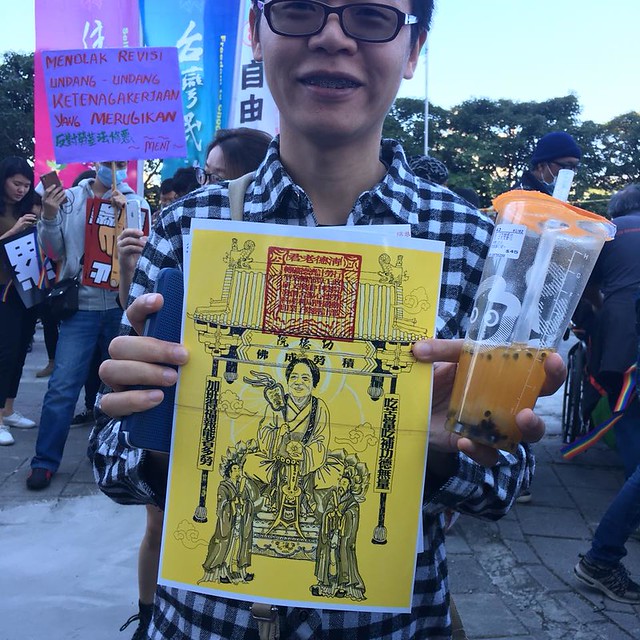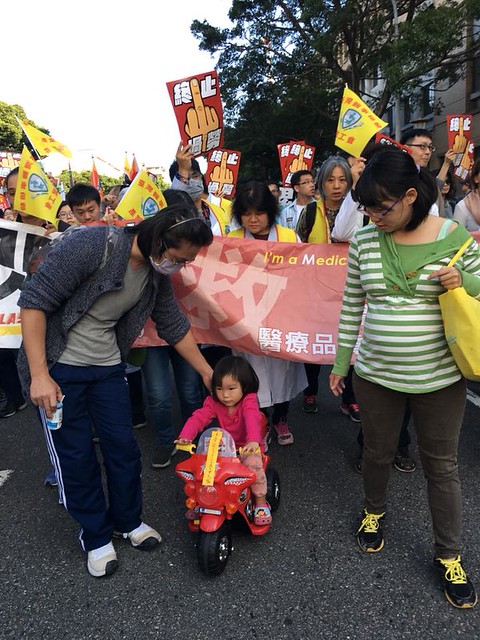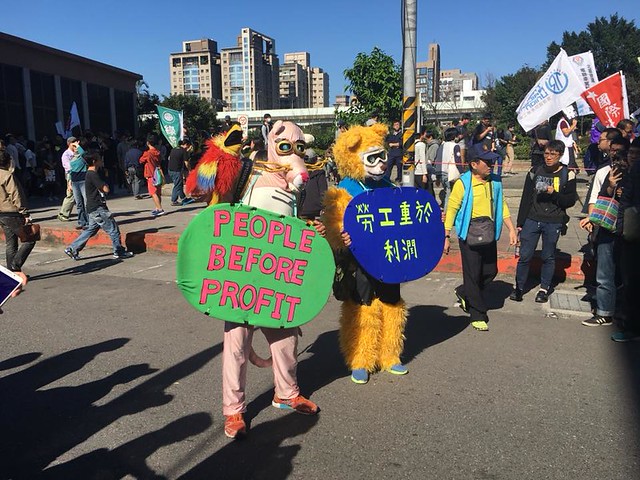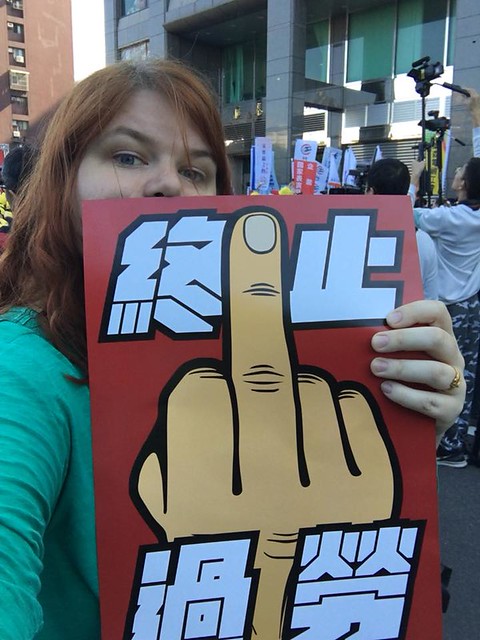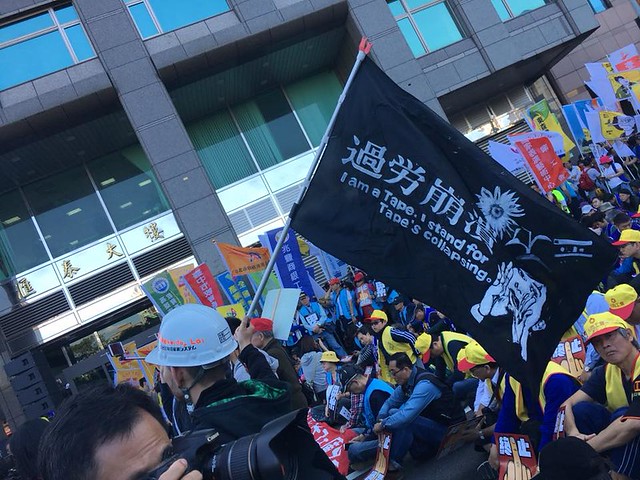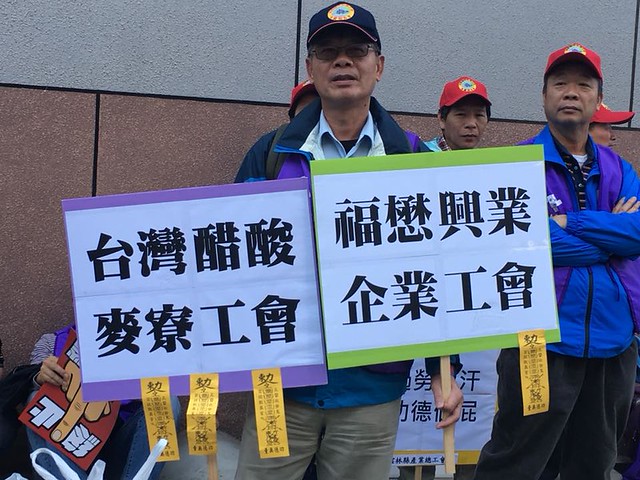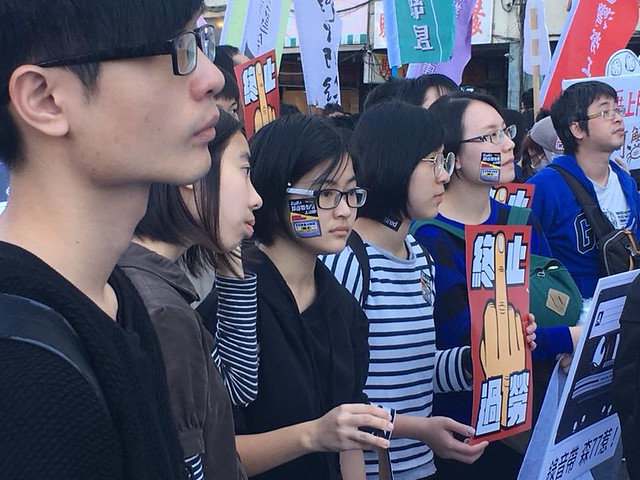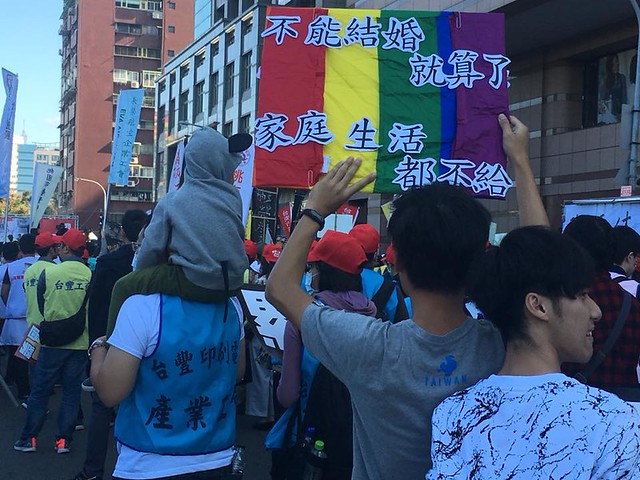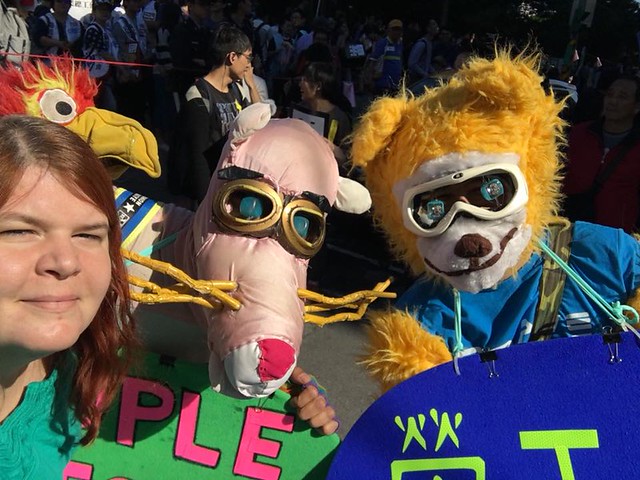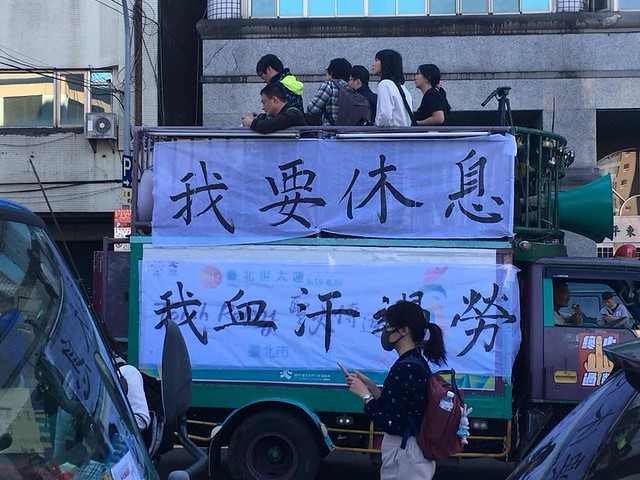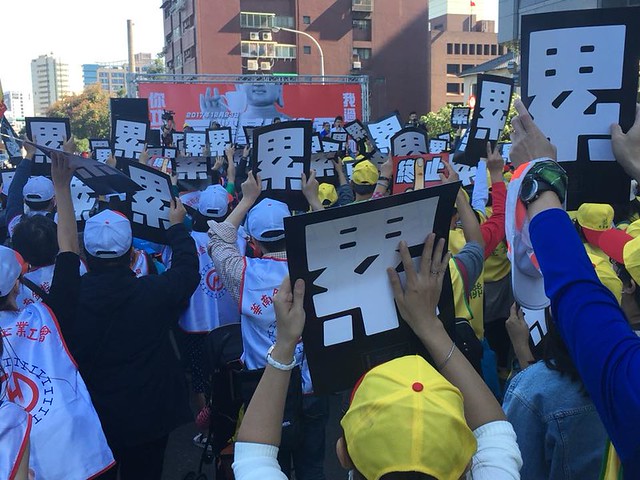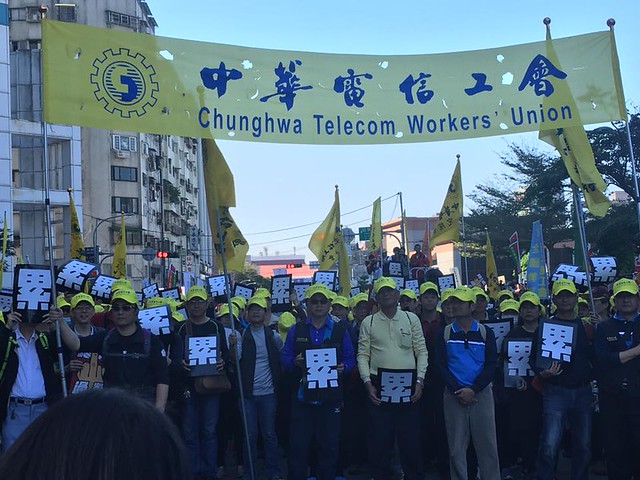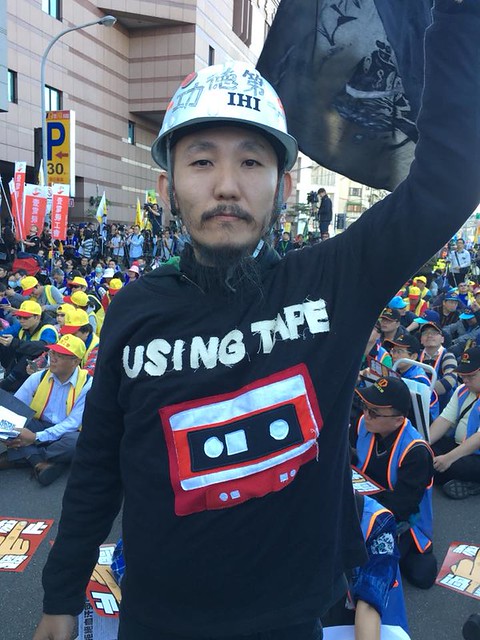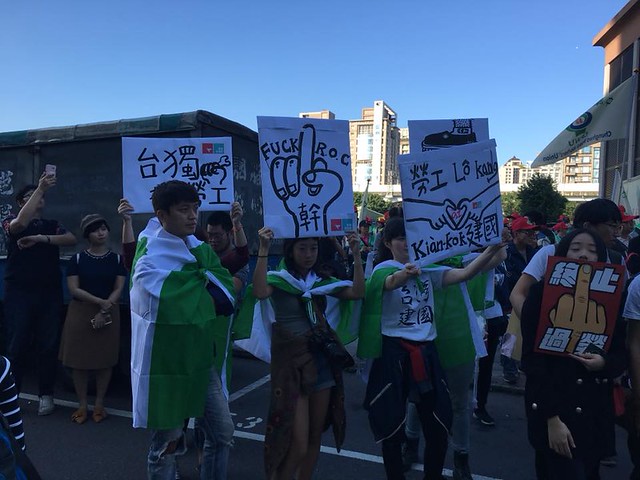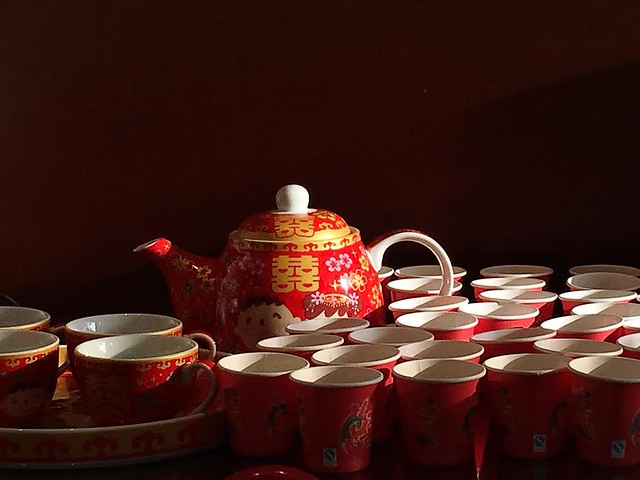
This past weekend, I went to Hong Kong and Macau - Hong Kong simply because we like visiting, and Macau for the wedding of one of my graduate school classmates. Because we traveled internationally, we were invited to the 'wedding games' and tea ceremony (where the couples serves tea to their elder relatives and generally receives gifts - mostly in the form of gold jewelry - in return. This is common in Taiwan too, though the games are not as common these days). I was very honored to be invited, as such ceremonies are typically only reserved for close family and perhaps best friends (close enough to be bridesmaids or groomsmen). As someone who doesn't have a Taiwanese family, I of course had never attended such a ceremony. I do have close Taiwanese friends, but not having grown up here means I don't have the sort of 'besties-since-childhood' sorts of relationships that, if they last, tend to lead to one being attendants at each others' weddings.
It occurred to me as I took photos to share - while no professional, I like to think I'm a pretty okay amateur photographer - so that her friends and family as well as our classmates could see, it occurred to me that someone who doesn't know me might think I was taking and posting pictures of a traditional Cantonese wedding (the morning, especially, was done pretty traditionally) to make myself look cool or interesting. You know,
look at me, I'm not a boring white lady, I live abroad and have cool international friends and I was invited to this wedding in Macau because I'm so interesting!
Of course, I know that's all bollocks - the bride is a true friend. She's Good People. But that it even entered my mind that someone who didn't know me but came across my pictures might rush to conclusions...well...
The next day we took the ferry back to Hong Kong. It was New Year's Day,
when there is typically a pro-democracy march. This year,
apparently over 10,000 people attended, although that number had dwindled by the time I was able to check it out later in the afternoon.
I didn't go.
I considered it, but in the end I stayed away (although I did wear my "FUCK THE GOVERNMENT 自己的國家自己救" t-shirt around the city, just to show some form of solidarity). If it had happened while there was a large crowd I could have gone as an observer, but when clashes with police started breaking out, it would be hard to stand by merely to watch. I'm not a Hong Kong resident and I don't blend into a crowd in Asia - plus, there is a line I try not to cross: while others may disagree, I actually don't think it's a good idea for non-residents to participate in such actions. Leaving aside that allowing this would open the door for hostile countries to send in 'fake protesters' on tourist visas to obfuscate the goals of civil society (as China is very much trying to do in Taiwan), I don't care for the idea of wannabe-do-gooder trustafarians jetting around the world to take part in social movements they might only have a surface understanding of (although of course plenty of people who don't have residence in a given country may be much better informed).
I feel this way even about actions I otherwise agree with.

So, I stayed away in Hong Kong even though I am quite happy to get involved in Taiwan. Why? Because I'm a resident here. It's my home. After 11 years and a great effort undertaken to stay informed, I think I've earned the right to be active, within the confines of the law, in the goings-on of my home even if I am not a citizen.
And yet it occurred to me again as I sat eating my
bhel puri at a Chungking Mansions stand called "Chaat Corner", that someone who didn't know me could well come to the conclusion that I was wearing my "FUCK THE GOVERNMENT" t-shirt, or getting involved in protests in Taiwan (which, as a resident, I am legally allowed to do), as a way of making myself seem more cool and interesting than being just another foreigner who lives abroad and isn't anything special - which is exactly what I am.
That got me thinking even more - why do I feel the need to have ironclad defenses for the things I take part in? Why is it important that the wedding I attended was for a true friend, and why does it matter that I am very nominally involved in social movements (no, like,
very nominally) in Taiwan because I care about the country I live in, and not any other reason?
Why do I feel the need to explain myself - and my life - at all?
And I realized - because there seems to be only a very narrow range of "acceptable" reasons for a foreigner - and most especially a white, Western foreigner - to:
- Live in Asia (or abroad in a non-Western country)
- Learn a non-Western language (such as Mandarin)
- Study/learn about a non-Western culture or country, including its politics or even get involved
- Volunteer in a foreign country
- Attend events and functions by and for people of color, including abroad
- Adopt cultural practices of a foreign country, especially a non-Western one
It's not okay, according to this line of thinking, to move abroad just because you are curious or looking for something new. It's not okay to attend a festival just because it seems interesting, and you need to travel, volunteer or learn a language or about a culture for a
reason. And that reason has to fall within a subset of "okay" reasons, or you are just another white kid trying to make themselves seem cooler or more interesting at best, or at worst, doing real harm by volunteering when locals could and arguably should do the job better, tokenizing someone else's cultural practices or getting involved politically for the wrong reasons.
You can't move abroad just to move abroad, you need a reason for wanting to go, and it has to be a good one. No "
I wanted a little adventure" and certainly no "
I wanted to find myself" (barf).
"I spent a semester in India and wanted to explore Asia further" is okay. "
I wanted to embark on a lifelong career as a teacher and had already started learning Mandarin so it made sense to move to Taiwan" is better.
You can't be interested in Taiwanese politics (as, say, I am) just because it is interesting: you have to have a reason ("
This is my home so I care about what goes on here").
I get why that is. There are issues with affluent, usually white kids going abroad to party on a beach, treating every foreign setting as the backdrop of
Brad Finds Himself.
There are certainly issues with these same sorts of people moving abroad for 1-3 years to 'teach English' without actually caring about the country or the teaching profession, or doing the same to 'volunteer' (i.e.
taking cute pictures of themselves with photogenic local children and making themselves feel good, but not actually helping). There are issues with privileged Westerners inviting themselves to events that are not for them, rather than
being invited. There are certainly issues with collecting token friends of color to make oneself look 'woke' or 'international'. There are absolutely issues with appropriation: taking a cultural practice that is not natively yours and adopting it simply because it looks or seems 'cool', not because of any deeper understanding or appreciation of it.
So, the good thing about the narrowing of what is an acceptable reason for being involved in a foreign culture is that it forces us privileged whiteys to reflect on why we do what we are doing, what effects it might have and what harm it might be causing that would otherwise be unseen to us. We aren't allowed to be ignorant any longer - we can't crash the party and ignore the stares. We can't stumble hungover up a hill in Thailand and take pictures of "quaint" villages, ignoring the locals muttering about how annoying we are. We can't turn entire towns and coastlines into backpacker holes and pretend that there are only positive impacts to doing so. We can't pretend we are 'different' from any other Westerner abroad simply because we want to be. We can't use other people's homes and cultures to make ourselves seem more interesting without repercussion.
We actually have to
think about what we do - and that's a good thing. If you don't have a good reason for doing something, why are you doing it at all?
It also opens the door for something more meaningful. If you are conscious of the consequences your actions may have, you are more likely to form real friendships, be welcomed when you want to get involved, do some actual good when you turn up, and get invited to the party because you are genuinely cool and people genuinely like you.
I know that having to thread this needle - having to have a
reason when people asked me why I came to Taiwan, why I stayed, why I'm interested in the things I am - has forced me to reflect on my own past. I don't have a perfect reason for coming to Taiwan. I didn't know then that I wanted to be a career teacher - I was just another buxiban clown with no qualifications or experience other than my native language and skin color, which aren't qualifications at all. I didn't know that I would stay - my plan was 2-3 years. I didn't know that I'd come to genuinely care about Taiwan and make real friends here - that just happened. I really was just a stupid twentysomething privileged white kid who wanted to live abroad for...no good reason at all, other than that I wanted it (although wanting the experience and challenge of living in another culture longer-term and coming to understand it in some depth is not the worst reason, and I did want that, too). Taiwan was my backdrop, and I can't blame any locals who might have found that annoying.
Things changed, but that's who I was. Plain and unvarnished.
I can admit that now, because I was forced to reflect. I'm a better person for it, and I like to think my presence here is more worthwhile - that I am contributing more to Taiwan - for having done so.
On the other hand, taken too far, this attitude could well drive people away, when their minds might have otherwise been opened.
If you hear "
god I hate it when people learn Mandarin just to seem more cool or interesting", and you'd previously been considering learning Mandarin, are you going to sign up for that class or not? Especially if you don't have a good
reason yet, other than pure curiosity? But if you don't sign up, you are one more whitey who never learned Mandarin.
If you hear complaints about Westerners treating the rest of the world like their vacation playground - which I admit is absolutely a problem - but rarely anything positive about going abroad to learn about the world, are you more likely to get on that plane and go learn about the world, or stay home, afraid your travel isn't ethical enough, because you haven't got a good reason? How do you then get out of your bubble and see what the rest of the world is like?
If you had the idea to try living abroad for awhile, but were told you could never be of any use or make any contribution, that doing so would be for personal gain while harming the country you lived in, would you do it? What if you were told you could move abroad, but only for a specific set of right "reasons" - and if you didn't have one, too bad so sad, but you had to stay in your bubble (and then be criticized for not knowing more about the rest of the world)?
How would you develop an interest in anything beyond what's in the bubble of what you already know?
If you are constantly told that every use of a cultural practice not natively yours is "appropriation" (which is definitely not true, but there are people who believe it), are you ever going to come to understand another culture if you stay away from it all? Even if you move abroad, how will you ever pop your foreigner bubble if you avoid any habit that is just common and natural in the country where you live because you are afraid it's "appropriation" to use chopsticks or take your shoes off inside, or do anything you didn't grow up doing?
At some point, I do wonder how reasonable it all is. We Westerners are privileged as a class, yes, but we are also imperfect as individuals. We can be better, but we'll always be flawed.
It is reasonable to expect I had a good reason for coming to Taiwan, but unreasonable to expect me to conjure one up retroactively. Dishonest, even. I didn't have a good reason, and the best I can do is admit that now. I suppose that could cause some to think I shouldn't be here at all, but this strikes me as unreasonable as well: despite my early blunders, I do have a life here. Friends - which make up my local roots - cats, work, marriage, a home.
I suppose you could expect everyone to craft a finely-wrought reason for their interest in a foreign language, culture or country. At what point, though, does that too become dishonest? Constructing a reason that sounds right - no matter how accurate - rather than just speaking plainly?
I guess what I'm trying to say is, I appreciate the modern emphasis on considering why we do the things we do, pushing us to think beyond the personal satisfaction our actions bring, but also the consequences they might have. It forces us to consider our role in the world, and what good or harm we might be doing where these issues of race, class, privilege, culture and politics intersect. It makes us come to terms with the fact that the rest of the world is not an exotic backdrop to our personal journeys, and other cultures don't exist for us to pick and choose from to make ourselves more interesting.
And yet, good reasons sometimes come later. I have good reasons for staying in Taiwan
now, but I didn't have a good reason to come here. I have good reasons to work on my Mandarin and my Taiwanese
now, but I didn't have a good reason to start learning it. I can say I was not simply interested in seeming cooler or more interesting, but you're free not to believe me. I have good reasons to be involved in Taiwanese civil society
now, or at least write about it, but I didn't have a good reason to start.
Because I am not unblemished, I'm not going to judge anyone too harshly for not having a good reason for learning Mandarin - it is better, I think, that they learn it for whatever reason than that they don't learn it at all (if they learn just a little bit to seem like a Cool White Guy, chances are they have other character flaws too and I'll likely stay away. But I wish them well on their language-learning journey).
I won't come down too hard on folks who don't have a good reason beyond bumbling youthful curiosity for why they ended up in Taiwan. That was me once. Maybe they'll make something better of themselves. If they never do, again, that's probably indicative of other character flaws anyway.
If I meet someone who seems to be in Asia for the sole purpose of seeming more interesting than he or she actually is, chances are I won't find them that interesting so what I think of their 'journey' is a moot point. Maybe their eyes will eventually clear - I hope so.
And if not, well, that will become apparent in time. If Brad can't quit it with dressing like a cross between Confucius and a Thai fisherman and talks about 'the East' as though there are gong sounds constantly in the background, that'll make itself clear soon enough. There may well be natural consequences - being excluded, not being made to feel welcome, wondering why one has put down few if any local roots. If these don't work, and the situation is clear, maybe then it's worth speaking up.
In short, you don't need to be perfect. You don't always need a perfect reason - your reason might come later. But you absolutely do need to reflect.


